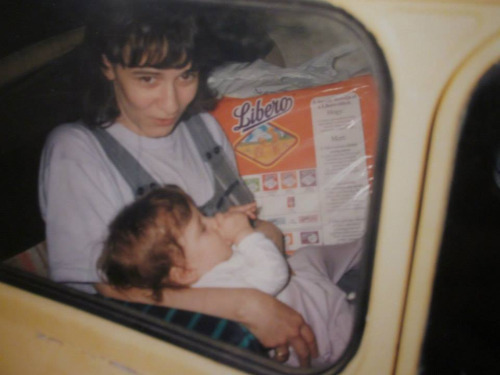I always identified as “east european”, more than anything else, including my nationality or the pretentious “Budapest citizen” used by my fellow Budapest intellectuals to distinguish themselves from the general hungarian reality which they regarded as “racist” and generally backward (arguably with some truth in it). What this east europeanness meant for me precisely, would be the object of another post, but coming to ukraine with a group of international experts meant the first case when i started to feel as someone “from the west”, with the allures and assumptions i associated with this position. Besides my freshly acquired status as an “expert” (which i still find hilariously exaggerated), this feeling arised from the huge and unmistakeable difference between the europeanized, polished misery of my central european homeland and the authentic and real stagnation of this abandoned borderland of Europe.
We got off the train in Zaporizhya and suddenly the roads were full of zhigulis and ladas. some of them renovated extensively, added by electric windows or alarm systems, but still a 30 year old soviet car intended to use it as an integral part of daily transport. The only zhigulis i saw in Budapest were glimmering oldtimers or the one of my hipster friend attracted to socialist realia in an amiable way. This was the reality of our childhood after all: i was brought home from the hospital in my father’s yellow trabant, followed by a dacia and finally a skoda, before western cars finally got in for the lower middle class in the late 1990s. Accordingly, i felt a relaxing wave of nostalgia combined with a sense of distance: this is a foreign land to me that i can comprehend as a time travel at the first impression, although time surely passed here since the collapse of soviet union, only among radically different conditions than in Central Europe.
One of the significant features of my time travel was what i identified as a sort of shortage economy. The project leaders in kiev reminded us to bring a sufficient amount of cash, as usually there is not enough funds in the local atms, and there really wasn’t. The second eloquent sign was the ultimate lack of diet coke in any restaurants, cafés and grocery stores i attended in the city and the surrounding region. This does not mean a real shortage: shops were full of all the necessary food items, and the catering we encountered in different places around the city just excelled anything i can get in any european capital for a random lunch. the myth of ukraine as “the pantry of Europe” was confirmed by each meal we had there. Among these idyillic conditions i could easily forget about my diet coke, it was not a priority anyway; it was the idea that remained striking for me, why this product is completely unpresent in a corner of europe abandoned by major financial investments but not by the capitalist circulation of goods in general. You can get a normal coke without any difficulty after all. Does the answer lie in the different consumer habits?
i do not consume sugar. okay, sometimes, in some grandma cakes, yes. but definitely not in soda. I saw the buzzfeed style educational image about the sugar content of processed drinks, and i cannot bring myself to insert those amounts in my body. i also read about artificial sweeteners, so my best would be just drink water (or wine), but one needs some variety occasionally, and this seems to be the lesser evil. in the magical times of my childhood among ladas and zhigulis i did not have any problem with drinking coke on birthdays while stuffing myself with grandma cakes; my aversion is clearly a result of the current discourse of health-conscious consumption, a strong element of an educated middle class socialization. The last time i didn’t get my diet coke was in a working class bar in the 8th district of budapest, the place defined by spatial segregation, poverty, ethnic minorities and bad reputation. The lovely lady behind the counter answered my request with a little frown: no, we don’t sell this sick stuff here. From these experiences i drawn the starting lesson that diet coke is somehow not a thing in these places. Besides the materiality of economic flows in the region, the lack of diet coke might express something about the local imageries about how life should be lived and what are the necessary, harmful, or desirable conditions of this practice.
(Personally, i would exchange the permanent supply of stupid diet coke for those varenkis without hesitation, but maybe more on that later)
